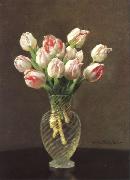China al por mayor de Marco de Oleo |
|||||||||||

|
|||||||||||
|
|
|
||||||||||||||
|
Otto Scholderer
(25 January 1834 - 22 January 1902) was a German painter. He was born in Frankfurt am Main. On completing his schooling, Scholderer went to the Städel academy of arts in 1849, where he remained until 1851. Among his teachers were the art historian Johann David Passavant and the painter Jakob Becker. Subsequently, Scholderer established himself in Städel as a freelance painter. During this period his friendship with Victor Meller began; Scholderer became his brother-in-law in 1868. Through Meller, Scholderer became acquainted with the works of Gustave Courbet. Scholderer made several short study trips to Paris between 1857 and 1858, where he became friends with Henri Fantin-Latour and Édouard Manet, whose influence can be seen in his subsequent work. Fantin-Latour depicted Scholderer in his picture Studio aux Batignolles . Starting from 1858, Scholderer worked and lived predominantly in Kronberg in Taunus, where his colleagues included Anton Burger, Peter Burnitz and Louis Eysen; he was close to the Kronberger painter colony. In 1866, Scholderer established himself in Desseldorf and made friends with Hans Thoma. With Thoma, Scholderer went in 1868 to Paris and returned to Germany only shortly before the outbreak of the French-German War. First Scholderer established himself in Munich, renewing his friendship with Wilhelm Leibl and becoming one of the artists of the Leibl-Kreis (Leibl circle). At the beginning of 1871 he went to London and worked there till the autumn of 1899. After 1899, Scholderer returned to his hometown of Frankfurt, where he died at the age of almost 68 years on 22 January 1902. Otto Scholderer's art, initially dominated by landscapes, later consisted primarily of portraits and still lifes. The important connection between the romantic period and the Impressionists is evident in his work. |
||||||||||||||
|
|
||||||||||||||
|
||||||||||||||
|
|
||||||||||||||
| Otto Scholderer
(25 January 1834 - 22 January 1902) was a German painter. He was born in Frankfurt am Main. On completing his schooling, Scholderer went to the Städel academy of arts in 1849, where he remained until 1851. Among his teachers were the art historian Johann David Passavant and the painter Jakob Becker. Subsequently, Scholderer established himself in Städel as a freelance painter. During this period his friendship with Victor Meller began; Scholderer became his brother-in-law in 1868. Through Meller, Scholderer became acquainted with the works of Gustave Courbet. Scholderer made several short study trips to Paris between 1857 and 1858, where he became friends with Henri Fantin-Latour and Édouard Manet, whose influence can be seen in his subsequent work. Fantin-Latour depicted Scholderer in his picture Studio aux Batignolles . Starting from 1858, Scholderer worked and lived predominantly in Kronberg in Taunus, where his colleagues included Anton Burger, Peter Burnitz and Louis Eysen; he was close to the Kronberger painter colony. In 1866, Scholderer established himself in Desseldorf and made friends with Hans Thoma. With Thoma, Scholderer went in 1868 to Paris and returned to Germany only shortly before the outbreak of the French-German War. First Scholderer established himself in Munich, renewing his friendship with Wilhelm Leibl and becoming one of the artists of the Leibl-Kreis (Leibl circle). At the beginning of 1871 he went to London and worked there till the autumn of 1899. After 1899, Scholderer returned to his hometown of Frankfurt, where he died at the age of almost 68 years on 22 January 1902. Otto Scholderer's art, initially dominated by landscapes, later consisted primarily of portraits and still lifes. The important connection between the romantic period and the Impressionists is evident in his work. oil on pappe Dimensions 41.3 x 30 cm (16.3 x 11.8 in) cyf |
||||||||||||||
|
Related Paintings to Otto Scholderer :. |
||||||||||||||
|
|
||||||||||||||
|
|
||||||||||||||
|
CONTACTE EEUU |







